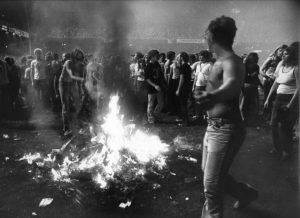Silenced by the Mainstream: Censorship & Backlash
By the late 1970s, disco was everywhere. It had taken over the charts, fashion, clubs, and even mainstream advertising. But with its rise came a violent backlash—one rooted not just in musical preference, but in race, gender, and sexuality.
The most infamous expression of this backlash came on July 12, 1979, during what was marketed as a quirky promotional event at Comiskey Park in Chicago: Disco Demolition Night. Attendees were encouraged to bring disco records in exchange for discounted baseball tickets. These records, many of them by Black, Latinx, and queer artists, were piled into a crate and blown up between games.
What followed was chaos: thousands stormed the field, riots broke out, and the second game was cancelled. For some, it was just a stunt gone wrong. But for those who loved and lived disco, it was something darker, a public burning of identity.
“They thought they were burning records. We saw them burning people’s lives.”
– Former club DJ, Chicago, 1980
The truth is, this backlash didn’t come out of nowhere. Disco had disrupted cultural norms. It centered voices of color. It elevated queer icons. It put women on stage with power and agency. To many in the dominant culture, this wasn’t just unfamiliar, it was threatening.
The anti-disco sentiment wasn’t subtle. Radio DJs declared “Disco Sucks”. Rock fans wore anti-disco shirts. Critics dismissed the genre as shallow, overproduced, and mindless. But these complaints masked deeper anxieties: about integration, about feminism, about sexual freedom.

Crowd sets rejected records on fire at Disco Demolition night in Comiskey Park, Chicago, July 12, 1979. / ST-17500981-E1, Chicago Sun-Times collection, Chicago History Museum
In many ways, disco was too inclusive, too joyful, too liberating for its time. And so, it had to be silenced. Radio stations dropped disco hits overnight. Labels abandoned disco acts. And within months, what had been the sound of a generation became a punchline.
Yet, disco didn’t die. It evolved. It mutated into house, garage, and electronic dance music. Its rhythms lived on in pop and R&B. Its attitude shaped fashion, visual art, and queer performance. And most importantly, its message – of community, resistance, and joy – never stopped resonating.
That’s why International Disco Day is celebrated every year on July 12. Not to mourn what was lost, but to reclaim what was stolen. To turn a day of destruction into a day of defiance and pride.
By honoring disco’s legacy on this date, we flip the narrative. We refuse to be erased. We dance in the face of those who tried to silence us.
Disco was not just about escapism. It was about expression. And while its critics may have turned down the volume, they never extinguished the fire.
CONTINUE EXPLORING THE SOCIAL AND POLITICAL DIMENSIONS OF DISCO:
• Roots of Resistance
• The Sound of Liberation
• From Stonewall to Studio 54
• Feminist Voices in Spotlight
• Dancefloor as Protest
SOUND REFLECTIONS:
A few tracks that powerfully reflect the social and political dimensions of the disco movement, whether through their lyrics, symbolism, context of creation, or their role in the fight for equality, freedom, and identity expression:
“I Will Survive” – Gloria Gaynor (1978)
“You Make Me Feel Mighty Real” – Sylvester (1978)
“Love Is The Message” – MFSB (1973)
“Ain’t No Stoppin’ Us Now” – McFadden & Whitehead (1979)
“The Bottle – Gil Scott-Heron (1973)
Full Spotify playlist: TOP 500 ESSENTIAL DISCO CLASSICS (1972-1979)
